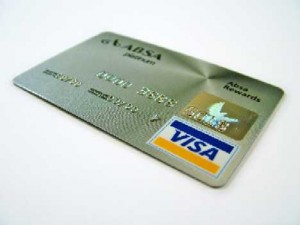So you just got your first credit card; pretty cool, huh?
Being able to swipe your card in place of cash or checks is an experience that leaves you feeling free and unfettered. You can spend, and spend and not have to worry about the expense…right?
WRONG!
Spending with your credit card without placing a limit on yourself is a dangerous way to live. You end up spending more than you want to spend or worse, spending money you don’t have.
The best way to ensure you will be debt free is to choose the right bank, the right card, and the right spending limit (whether that is a limit put in place by your bank or a limit you put on yourself is up to you).
While there are plenty of pros and cons for opening a credit card, if you follow these money managing tips, you can keep your debt low and your credit score high.

Set a limit on your credit card
The day you get your card, make sure you have a limit and that the limit is appropriate for the amount of money you make.
Don’t let the person on the other side of the table tell you what your limit will be; set the limit on your credit card and remain in control of the situation.
Create a budget
Instead of cashing your paycheck each week before ever considering how much you will spend, start planning ahead so you will know how much money you make each week and how that will affect your ability (or inability) to pay your bills at the end of the month.
Start making a real budget; calculate how much you get paid each week and then how much you will make for the month.
Once you know exactly how much money you are working with, it will be easier to plan a budget and pay your bills.
If you are getting money from your parents or another source, don’t forget to factor that amount in. OR if you want to see how well you can do with your OWN money, try managing the money YOU make and see how well you do; you will always have the other money as a backup plan.
Make a list of your expenses: wants and needs
There are always things you will WANT and things you NEED. Take the time to understand the difference between the two as it pertains to you so you can decide which things to cut from your spending lists and which things to keep.
When you go to the grocery store, make sure to leave enough money in your budget to buy the essentials like toilet paper, toothpaste, soap, eggs, bread, milk, etc. and cut out the things you don’t need like ice cream, cookies, chips, or soda.
Instead of buying these things every week (which will only add to your bill at the end of the month), treat yourself to one or some of these items every once in a while so you can still indulge your cravings, but you won’t end up over-spending.
If you love to shop or frequent the mall often, change your habits! Stop tempting yourself all the time by surrounding yourself with tempting sales and items you want. If you keep yourself out of the stores, you won’t be tempted to swipe that plastic.
Love going out to eat? Start cooking in or eating meals in the cafeteria. Going out to restaurants all the time is not necessary (especially if you have a meal plan) and can be a HUGE waste of money. Calculate the number of times you go out to eat (even for small things like a coffee and bagel) and you will see how much it adds up.
Make a list of your bills and create a payment schedule
Gather up all your bills in a pile and make a note of what the bill is, how much it is every month and when you need to pay it.
Purchase a file-holder so you can keep track of each company and all of your paid as well as your unpaid bills. If you keep strict records of everything, you will always know where everything is and you won’t have to run around looking for something if a problem arises.
If you make a schedule (I suggest buying a calendar) and write a reminder on the days you are to pay your bills, you will never wonder when things are due or if you paid them.
I would suggest scheduling your payments a few days to a week before they are due so you can avoid the stress of wondering if your bills are paid on time or if you have enough money to pay them.
Save if you can
If you can, try saving some of your paycheck each week so you always have some money to fall back on in. The last thing you want to do is commit to paying a bill only to find that you don’t have enough money at the end of the month to pay it.
Keep SOME money in a savings account and you can count on that money if the situation arises.
Having a credit card in college is a big responsibility, especially if you are paying the bills!
In order to keep your debt low and your credit score high, you must follow these tips for smart spending, saving and paying your bills on time! If you stay organized, save some money, and allocate your resources properly, you should have no problem building your credit score and paying your bills on time.


